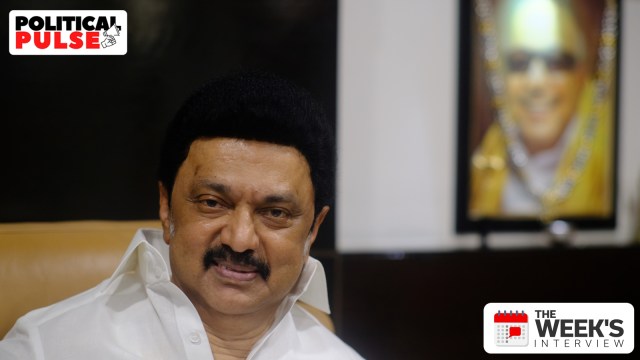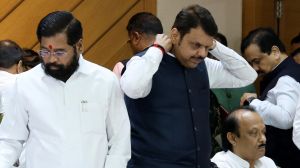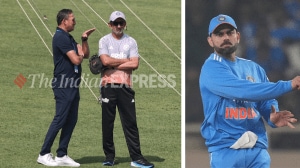‘It’s a battle for democracy. But, we have a strong team… Akhilesh, Kejriwal, Uddhav, Mamata, Tejashwi… a dynamic young leader like Rahul’: M K Stalin
“After a decade in power, rather than showcasing his achievements, Modi is busy dredging up past... using every tool to keep Oppn in check, arresting leaders": DMK chief, Tamil Nadu CM
 "You have got to understand that the DMK's role in Indian politics is not just about snagging a few ministerial spots at the Centre. Our influence has been historically significant," Tamil Nadu CM M K Stalin said. (Express photo by Arun Janardhanan)
"You have got to understand that the DMK's role in Indian politics is not just about snagging a few ministerial spots at the Centre. Our influence has been historically significant," Tamil Nadu CM M K Stalin said. (Express photo by Arun Janardhanan)With a photo of his father, the late DMK stalwart and Tamil Nadu chief minister M Karunanidhi, looking over his shoulder at his Chhitaranjan Salai residence here, CM M K Stalin exudes confidence ahead of, what he calls, “a second struggle for Independence” in the coming elections.
Having settled any doubts about whether he would be able to fill Karunanidhi’s shoes, by leading the DMK to a Lok Sabha poll sweep in 2019 and a state Assembly election win in 2021, the 74-year-old is now the face of the INDIA bloc’s hopes in Tamil Nadu.
Stalin is well-aware of that, and in an interview with The Indian Express, reinforces his anti-BJP stance as that against the Centre’s “hegemony”. As to whether he can be described as “a man of patience”, given his long wait to inherit his father’s legacy, Stalin says: “I take it with a smile.” Excerpts:
You have seen many Lok Sabha elections. How do you see this one, where you are leading the anti-BJP alliance in Tamil Nadu?
It feels like we are in the midst of a second struggle for Independence. It’s all about defending the core of India: democracy, secularism and our pluralistic society, not to mention the principle of federalism. The DMK, along with our allies in the INDIA bloc, we are in this democratic fight to save the nation from what I would frankly call fascist forces.
 “As CM, whether it’s official visits, community events, or casual encounters on streets, I never miss an opportunity to talk to young people,” M K Stalin said. (Express photo by Arun Janardhanan)
“As CM, whether it’s official visits, community events, or casual encounters on streets, I never miss an opportunity to talk to young people,” M K Stalin said. (Express photo by Arun Janardhanan)
When I was leading the youth wing of the DMK, I used to tell my party colleagues: ‘Accomplish, or die trying’. And there is no question in my mind that we are going to accomplish what we have set out to do. This election isn’t just a critical juncture for us; it’s a do or die battle for Indian democracy itself. But, we have got a strong team. Leaders like Akhilesh Yadav, (Arvind) Kejriwal, Uddhav Thackeray, they are all in it with us. We are united in this fight, recognising the gravity of the moment.
Why did your government decide to go to the Supreme Court over fund allocation by the Centre? Is it a feasible move?
We were forced to do it. When Tamil Nadu was grappling with heavy rain and storm in December 2023… I personally reached out to the Prime Minister (Narendra Modi), asking that it be declared a national disaster. But guess what? No financial aid came from the Union government. We provided Rs 6,000 per family to those affected by the floods. When the Union government turns a blind eye even during such calamities, how can we bank on them for fair financial support or a decent slice of the tax revenues?
So, we took our fight to the Supreme Court… Financial aid is not a favour, it is our right legally speaking… Now, you might say this is all administrative stuff (declaring a national disaster etc). But tell me, when did the Modi government last call a meeting of CMs to sort out these so-called administrative issues? They (the BJP) love to talk about vibrant democracy and cooperative federalism, but where is it really? In practice, it’s non-existent.
Believe me, dragging the matter to court was not something we were happy about. Our hand was forced because of the Union government’s unfair and biased treatment.
What would you call your most significant contribution to Tamil Nadu among your myriad policies and social welfare schemes?
At the heart of the Dravidian model is the idea of ‘Everything for Everyone’. It’s a legacy we are really proud of, tracing it back to the Justice Party and the Dravidian political movement. We kickstarted the journey towards education and social justice in the Madras Presidency a century ago. This ethos has been carried through time in Tamil Nadu, with significant milestones like the establishment of primary education in Kamarajar’s (former CM Kamaraj’s) time and the expansion of higher education under Kalaignar (Karunanidhi).
Our focus has broadened to ensuring that the education provided is of high quality and to skill development, to meet the needs of today’s world. In my tenure as CM, I have rolled out schemes like ‘Puthumai Penn‘ and ‘Tamil Puthalvan’, giving a monthly scholarship of Rs 1,000 to students. It’s all part of our mission to fulfil Bharathiyar’s (Subramania Bharati’s) vision of an ‘educated Tamil Nadu’, where quality education and social justice are accessible to everyone.
Back in the 1960s, Tamil Nadu was similar to Bihar and Uttar Pradesh. But thanks to the visionary work of my leader Kalaignar, who is often celebrated as ‘the architect of modern Tamil Nadu’, we have transformed… ensuring that no one is left behind.
How difficult is it to check political corruption when fighting elections is becoming an increasingly expensive exercise?
Let me take you back to 1967, to the days of DMK founder Anna (C N Annadurai). He had an estimate for Tamil Nadu – Rs 10 lakh for both parliamentary and Assembly elections. And guess what? Kalaignar didn’t just meet that, he pooled Rs 11 lakh. This earned him accolades back then.
Fast forward to today, and the Election Commission has capped a parliamentary candidate’s spending at Rs 95 lakh. It’s no secret that the financial demands regarding running a party have skyrocketed… The key issue, especially for a budding democracy like India, is transparency.
… The Supreme Court recently threw the spotlight on a shadowy aspect of the BJP government’s financial disclosures during elections (referring to the electoral bonds judgment)… It just goes to show how these financial dynamics can lead to corrupt practices.
Beyond a few Union ministry posts, has the DMK ever considered playing a more prominent national role?
You have got to understand that the DMK’s role in Indian politics is not just about snagging a few ministerial spots at the Centre. Our influence has been historically significant… especially under Kalaignar’s leadership. The DMK has been instrumental in shaping the national leadership, playing a key role in the selection of Prime Ministers like V P Singh, (H D) Deve Gowda, (I K) Gujral, and Manmohan Singh.
Our commitment has always been to national welfare, like when we backed the nationalisation of banks under Indira Gandhi in 1971, stood firm against the Emergency in 1975, played a pivotal part in the Janata alliance in 1977, formed the National Front in 1989, and the United Front in 1996. We even supported the Vajpayee government in 1999 under a Common Minimum Programme, ensuring minority protections, and were a crucial force in forming the United Progressive Alliance (UPA) in 2004.
But the DMK has never aspired for top posts such as PM?
There were instances when high offices like that of the President, Vice-President and even Prime Minister could have been within Kalaignar’s reach. He humbly said, ‘I know my height’. But make no mistake, in the political landscape of India, Kalaignar and the DMK are towering figures, like the Himalayas… For us, it’s not just about power or positions; it’s about steadfastly upholding the principles of federalism, secularism, fostering a hate-free India, celebrating diversity, and ensuring equal respect for all languages.
How do you see the belief that people now lean more towards strong leaders, as they see parties as deprived of an ideology?
Political ideologies evolve as generations change, and it’s crucial for a leader to engage these new generations through ideological commitment. The Dravidian movement is a prime example, having walked this path from the times of Periyar, Anna, and Kalaignar, right up to the present. I agree that times change, but our core values like social justice, equality, state rights, and a deep passion for language remain unshaken.
The BJP, on the other hand, plays a different game. They fan religious sentiments, breed hatred, and marinate politics in RSS ideology. Today, they have Modi as their front man. It was someone else yesterday, and it will be yet another face tomorrow… Essentially, the BJP’s strategy hinges on crafting this larger-than-life persona for the PM.
But is the BJP’s success tied to Modi’s ‘single, unifying leader’ image, or to Hindutva?
They might tout Modi as ‘Vishwa Guru,’ but when you look at the indifference towards states like Tamil Nadu, or the confrontation at the border with China, his silence speaks volumes. He is no ‘Vishwa guru’. In the coming elections, a dynamic young leader like Rahul Gandhi is set to dismantle that cultivated image of Modi and the broader RSS narrative.
To what do you credit your success in keeping together a successful alliance in Tamil Nadu since 2019?
When we pieced together our alliance back in 2018, I made it clear that this was not just about political convenience; it was an alliance based on shared principles. Our coalition’s core aim has been to wrest back the fundamental rights guaranteed by Indian democracy and our legal framework from what I call fascist forces. And it’s this shared vision that has kept us united and effective since 2019.
How do you want people to remember you and your rule?
In public life, facing criticism is part and parcel of the game. Leaders in the Dravidian movement, including myself, have seen our fair share of tough times. I have faced criticism, sometimes really harsh, but my way of dealing with it has always been to get on with my work, to show through my actions what we are really about. Leading the DMK, it has been like steering through a storm, constantly fighting to keep the values of Dravidianism alive. I have stood my ground, firm and unwavering.
Still, how would you want people, not just DMK sympathisers, to remember you?
I’m not after any grand title. If people simply remember that ‘M K Stalin was a determined CM, who fulfilled the trust placed in him’, that is more than enough.
And there is no need to view DMK supporters separately, they are also the public and have voting rights.
You are admired for your patience in waiting so long to take over from your father. Are you the same in personal life?
Annadurai had waited a good 18 years before the DMK could finally win elections and come to power. And then there was Kalaignar. During the Emergency, after our government was dismissed, he waited 13 years to return to power. For anyone in public life, patience until fruition should be a core value.
Still, would you call such patience rare?
In Tamil Nadu, some have become CM using shortcuts, thinking that gaining office by any means is a qualification for politics, that landing a position is all there is to politics. But I started right at the grass-roots, as a youth cadre in the Gopalapuram DMK unit. So, this patience of mine, it’s not incidental. It’s a legacy handed down through our party’s ethos…
And you calling me a ‘man of patience’? I take your words with a smile, and dedicate it to our leaders.
Your family has also had deep roots in cinema.
Cinema runs in my family’s veins, starting from Kalaignar. I played the role of socially aware young men in movies like Ore Raththam (1987) and Makkal Aanaiyittal (1988). I have also acted in dramas and TV serials.
You are known to be an excellent leg spinner, and have been photographed jogging, cycling. What do you like doing in your spare time?
I love cricket! Even when I was the Mayor of Chennai, I played in a charity match to raise funds for the Kargil War with legends like Kapil Dev and K Srikkanth.
Exercise is a big part of my life, cycling and jogging keep me in shape. And when I find the time, I watch movies with my family, maybe sing a few old songs. Don’t forget that I’m M K Stalin, and yes, I’ve feelings too, just like you!
What is your fondest memory of your father?
Our Gopalapuram house was a home for Tamil Nadu as well as Indian politics. That is why Kalaignar was always busy, which in turn nurtured us in politics. Once, I met Annadurai seeking that he give us a date so that the Gopalapuram Youth of the DMK could celebrate his birthday. I insisted on an immediate response. His reply was: ‘You are as stubborn as your father.’ It deeply influenced my teenage self.
There are many memories like this.
Do you think it is tougher for older politicians like you to engage with the youth?
Despite my packed schedule, I always find time for family, attending gatherings, hanging out with friends, celebrating festivals like Pongal. This keeps me tuned to what the youngsters today are thinking, what they expect, and how we can meet their needs.
As CM, whether it’s official visits, community events, or casual encounters on streets, I never miss an opportunity to talk to young people. These conversations, be it with school children or college students or young professionals, help me get an idea about how they think, dream, live and engage with the world.
What explains your strong attack on Central agencies such as the CBI, Enforcement Directorate, Income Tax Department etc?
The Indian Express did this investigation which showed that once Opposition leaders jump ship to the BJP, their legal troubles suddenly begin to evaporate… This explains why 10 years of BJP rule have degraded India’s top investigative agencies, and why the Modi family is now equated to ‘ED-IT-CBI’.
After a decade in power, rather than showcasing their achievements, the Modi government is busy dredging up the past, pointing fingers at stalwarts like Pandit Nehru and Indira Gandhi. And what’s their main agenda now? Seemingly, keeping the Opposition in check, using every tool at their disposal, with even the Election Commission looking the other way as Opposition leaders face arrest.
And what’s the latest addition to the Modi family? The ‘RTI’ (Right to Information Act). Because they fear that people may not believe Modi’s words anymore, they have roped in RTI – the recent Katchatheevu issue raked up by the BJP (based on an RTI reply) was an example.
Have you ever ventured into writing like your father?
I started my writing by converting speeches of leaders into articles for the (DMK’s) Murasoli newspaper. Also I used to write about party events. Currently, I write a regular newsletter for DMK workers, titled ‘One of You’. All these are writings dedicated to our movement.
But otherwise, Kalaignar was a literary giant. He wrote literature, drama, cinema, novels, short stories, poetry, dialogues… I think it’s impossible for anyone to achieve success in all these fields. I am Kalaignar’s son, maybe what I have inherited from him is the ability to work tirelessly.
Do you think the DMK could have used the medium of cinema more for political messaging, as it used to do in the past?
No movement has used cinema as a weapon for political communication like the DMK. We have got a stellar lineup, right? Anna, Kalaignar, Asaithambi, Murasoli Maran, giants like MGR, S S Rajendran, Sivaji Ganesan, Vagai Chandrasekhar, and Ramanarayanan, all contributed to the screen under the DMK banner. Even though the current context has changed, the principles of social justice and speaking out against caste oppression that the DMK planted continue to be prominent in Tamil cinema. Films like Nenjuku Needhi (2022) and Maamannan (2023), starring (Stalin’s son and minister) Udhayanidhi, were based on the DMK’s ideologies.
Cinema is a medium of entertainment. However, our party knows the power of it, and we continue to use it. It keeps the conversation going.
- 01
- 02
- 03
- 04
- 05































